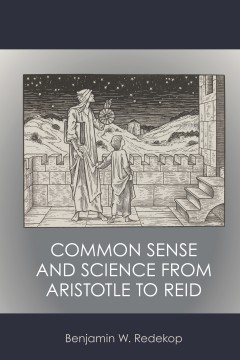Common Sense and Science from Aristotle to Reid
By Benjamin W. Redekop
Other Formats Available:
- About This Book
- Reviews
- Author Information
- Series
- Table of Contents
- Links
- Podcasts
About This Book
While the dynamic relationship between common sense and science has gone largely unrecognized in the history of ideas, Common Sense and Science from Aristotle to Reid reveals that thinkers have pondered the nature of common sense and its relationship to science and scientific thinking for a very long time. It demonstrates how a diverse array of neglected early modern thinkers turn out to have been on the right track for understanding how the mind makes sense of the world and how basic features of the human mind and cognition are related to scientific theory and practice. Drawing on a wealth of primary sources and scholarship from the history of ideas, cognitive science, and the history and philosophy of science, this book helps readers understand the fundamental historical and philosophical relationship between common sense and science.
The story begins in the ancient world, where “scientific” knowledge (epistêmê in Greek, scientia in Latin) arose in counterpoint to everyday understanding and common opinion, until Aristotle produced a reconciliation of the two that set the course for scientific thought for the next two millennia. It then moves into the early modern period, when the New Science of Copernicus, Galileo, and Newton emerged triumphant, and common sense and its relationship to science once again became problematic, remaining so to this day. The book goes on to examine this fraught relationship, and the early modern thinkers who sought to repair it, culminating in the thought of the philosopher Thomas Reid (1711–1796), the preeminent figure in the Scottish school of common sense philosophy. A comprehensive epilogue brings the story into the present. It is a story full of fascinating twists and turns, but ultimately a tale about the perennial quest to understand how the human mind is able to gain credible and reliable knowledge about the self, nature, other human beings, and God.
Reviews
“Redekop does an excellent job of distilling 2500 years of the history of common sense down to a manageable form. He provides a unique take on this concept within the history of ideas. Scholars and educated laypersons alike will find his work compelling. The book is particularly fitting for this particular time in history as science and the broader culture attempt to find common ground.”—Robert M. McManus, McCoy Professor of Leadership and Communication, The McDonough Center for Leadership and Business at Marietta College, Ohio
Author Information
Benjamin W. Redekop is Professor of Leadership Studies at Christopher Newport University in Newport News, Virginia. He has published numerous books in the history of ideas, Anabaptist studies, and leadership studies.
Series
Table of Contents
Acknowledgments; Introduction; 1. Common Sense and Scientific Thinking before Copernicus; 2. The Challenge of Modern Science and Philosophy; 3. Common Notions, Sens Commun: Herbert of Cherbury and Renè Descartes; 4. Hobbes, Locke, and Innatist Responses to Skepticism and Materialism; 5. Common Sense in Early Eighteenth-Century Thought; 6. Common Sense and Moral Sense: Buffier, Hutcheson, and Butler; 7. Common Sense and the Science of Man in Enlightenment; Scotland: Turnbull and Kames; 8. Common Sense, Science, and the Public Sphere: The Philosophy of Thomas Reid; Epilogue; Notes; Index.
Links
Stay Updated
Information
Latest Tweets



